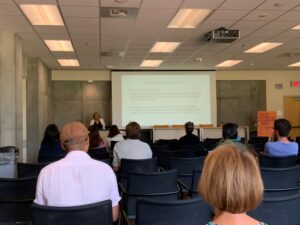
PERITIA Experts Join Conference on ‘Trust, Distrust and Forgiveness’
On 16-17 September 2022, PERITIA joined forces with the Department of Philosophy at University of California, Irvine for the international conference “Trust, Distrust and Forgiveness”. The two-day hybrid event brought together academics working in different subdisciplines of Philosophy, including law and technology, and featured contributions from PERITIA Coordinator and Project Leader Maria Baghramian, and Advisory Board members Judith Simon and Heather Douglas.
The conference aimed to reflect upon the “big” philosophical question of trust, its correlate mistrust, and their intersection with the arguably under considered topic of forgiveness. This latter concern was threaded through a number of discussions across the two days, most overtly in Dana Nelkin’s account of forgiveness as a normative landscape change.
PERITIA speakers deliberated upon various aspects of trust in science including the trustworthiness of artificial intelligence (Simon), the question of objectivity (Baghramian) and shared values (Douglas). Simon, presenting online from Germany, considered the question of whether and under what circumstances should we trust AI to support human decision making in different societal domains. This question has become increasingly salient given the biases inscribed in these technologies and their capacity to further entrench inequality. Simon observed that these social justice issues have been compounded by the lack of transparency around the proprietary algorithmic systems employed and the limited lay understanding of such complex systems. Simon concluded that AI’s trustworthiness hinges upon both epistemic and moral criteria, and much work remains to be done around explainable AI.

Professor Maria Baghramian delivers her keynote presentation at UC Irvine, Sep 2022.
Zooming out to focus on science more broadly, Baghramian posed the question of whether a value-laden science can meet the ideal of scientific objectivity. She opened her talk by identifying a potential tension between trustworthiness and objectivity that arises as a generally understood requirement of scientific excellence. In attempt to reconcile this tension, Baghramian considered revisionist accounts of epistemic egalitarianism put forward by Naomi Scheman (“trustworthy objectivity”) and Helen Longino (“attenuated objectivity”). Ultimately advocating benevolence rather than egalitarianism as a requirement of normative trust, Baghramian concluded by recommending what she coined “Objectivity +” or parity in expectations of epistemic and ethical reliability on the part of the experts.
Douglas, engaging with similar concerns as Baghramian, presented her account of the essentiality of shared values for trust in scientific expertise. Reconsidering the concept of “enhanced trust”, Douglas argued that trust in science depends on shared values and concerns, particularly in cases where science was proven wrong or harmful. She posited that epistemic failure is not always destructive of trust as science can often be wrong. However, the specific reasons for epistemic failure must be considered, and moral failures are neither acceptable nor easily forgivable in this context. Douglas concluded with the recognition that the disentanglement of epistemic and ethical concerns in practice remains a challenge.
Other speakers provided accounts of the relationship between trust and social compliance during COVID-19, hinge trust, trust/mistrust in epistemic networks, trust in objects, interpersonal trust as an “unguarded stance” and assessments of accountability and “strict liability” in law and morals. The concept of “hinge” in particular formed the topic of much debate as a new application to trust theory and the focus of several presentations. The lively Q&A discussions that ensued underscored the relevance of the work presented by the speakers to a wide range of contemporary concerns, including those central to PERITIA.


